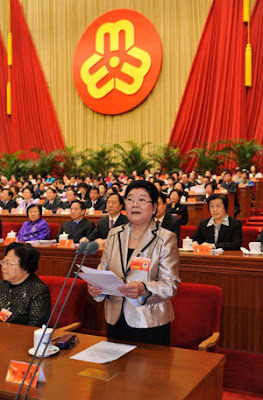 Gu Xiulian, chairwoman of the All-China Women's Federation (ACWF), presides over the opening ceremony of the 10th National Women's Congress at the Great Hall of the People in Beijing, China, on Oct. 28, 2008. (Xinhua Photo)
Gu Xiulian, chairwoman of the All-China Women's Federation (ACWF), presides over the opening ceremony of the 10th National Women's Congress at the Great Hall of the People in Beijing, China, on Oct. 28, 2008. (Xinhua Photo)by Xinhua writer Zhan Yan (7 March 2009)
BEIJING, March 7 (Xinhua) -- Li Guanyao felt honored when the bridegroom's family asked him, father of the bride, to give a speech at the marriage ceremony in Beijing.
The father knew that the bride's families would not be present at the marriage ceremony as a tradition. "Though the customs have changed, usually only the bridegroom's father can speak at a marriage ceremony. It shows the great respect they hold for myself and my daughter."
Li Lily, the daughter, earned much more than her husband and financed the apartment for their after-marriage living, though the two families are equally well-off. "My husband can accept the fact that I earn more than him. It makes me feel comfortable, because not every man can do that," she said.
Women are enjoying more important roles in China. From the age of foot binding through to today, the role and rights of women have undergone drastic transformation.
The country held the Tenth National Women's Congress in October last year, setting targets in the coming five years to boost women's involvement in social and economic development and their participation in state affairs.
"Chinese women's ability should be further improved so that they could play a bigger role in building a moderately prosperous society in an all-round way," said Huang Qingyi, All-China Women's Federation (ACWF) Deputy Chairwoman.
"Currently, women account for 45.4 percent of China's total employed population," said Huang, "Female officials account for more than 40 percent of all officials."
In political sector, Chinese women played a larger role.
Female deputies comprised 21.33 percent of the National People's Congress (NPC), up 1.09 percentage points from the previous congress, and women make up 17.7 percent of the 11th National Committee of the Chinese People's Political Consultative Conference (CPPCC), up one percentage point. The proportion of female deputies to the 17th National Congress of the Communist Party of China was up two percentage points. There are more than 230 female ministerial or provincial officials, Huang said.
China's maternal mortality rate has reduced to 36.6 per 100,000from 51.3 per 100,000 in 2003 and the infant mortality rate has dropped to 15.3 per 1,000 from 25.5 per 1,000 in 2003, Huang said.
"More women buy social security and their life expectancy has reached 75.25 years," Huang said. Statistics show China has about 27,000 women and children's rights protection agencies.
Women from ethnic minority groups and religious believers were also greatly motivated to contribute to the social development, Huang said.
These changes have been achieved against the background that women had been stereotyped to be inferior to men. For centuries before the early 1900s, there was a prominent male domination in China. Women were deprived of all rights and were present mainly to serve men. Women served as slaves, concubines and prostitutes. Marriages were arranged, sometimes preparing a female from infancy to serve her future husband.
This can be seen most effectively in the practice of foot binding. Beginning around the 11th century, foot binding became a tradition. When a girl became three or four, her mother would tightly wrap her daughter's feet in bandages with her toes tucked under the soles. On top of this excruciating pain, the bandages would be tightened each day. If a woman's feet weren't bound she was considered unsuitable for marriage.
Other customs prevailed such as housewives had to eat in the kitchen or at separate tables in formal family dinners, even if the visitors were their own relatives or friends.
Though enjoying improved status, some women complained the society adopts double standards to appraise men and women.
"I don't think women and men are equal. Living in a social circle dominated by men, I can feel the intangible pressure. It's not they don't respect us. My husband cooked for me and did everything right, but I can smell the male chauvinism in their bones. One man told me, he can't discuss anything serious with a woman. They just don't take women as intellectual equals," said Cao Chenhong, a white-collar woman in a foreign-invested company in Beijing.
For example, when it comes to social drinking, men get drunk at the dinner table and will be praised for their honesty and integrity, but when women get drunk, they will be criticized lacking self-discipline, she says.
By law, women have equality in education, marriage, rights and freedom, but the ingrained stereotype is hard to fight: boys are the ones to pass down family lines. The most worrying fact is China has an unnatural boy-girl birth ratio of about 118 males to 100 females due to sex-specific abortions every year.
Related article - Congress: China to boost women's status (China.com)
Question:
With reference to specific examples, discuss whether the status of women in China has changed over time.


No comments:
Post a Comment